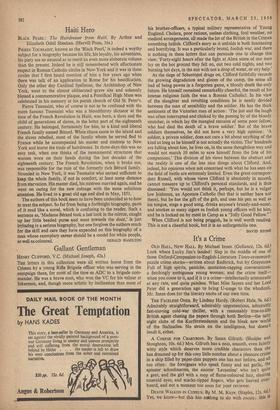Gallant Gentleman
THE letters in this collection were all written home from the Crimea by a young Rifle Brigade officer who was serving in the campaign there, for most of the time as ADC to a brigade com- mander. He was a brave man, who won the VC for his valour at Inkerman, and, though more artistic by inclination than most of his brother-officers, a typical military representative of Young England. Cholera, poor rations, useless clothing, foul weather, no medical arrangements, all made the lot of the British in the Crimea something hellish. Clifford's story as it unfolds is both fascinating and horrifying. It was a particularly brutal, foolish war, and there is nothing in these letters that can persuade one to change this view. 'Forty-eight hours after the fight at Alma some of our men lay on the hot ground they fell on, out two cold nights, and two burning hot days, in the sun with not a drop of water, or any help.'
As the siege of Sebastopol drags on, Clifford faithfully records the growing degradation and gloom of the camp, the sense all had of being pawns in a forgotten game, a bloody death the only future. He himself remained remarkably cheerful, the result of his intense religious faith (he was a Roman Catholic). In his view of the slaughter and revolting conditions he is neatly divided between the man of sensibility and the soldier. He has the thick sentiment of the Victorian man of action : 'The jest and the laugh was often interrupted and choked by the passing by of the bloody stretcher, in which lay the mangled remains of some poor fellow, who had died the death of a brave soldier.' But of the brave soldiers themselves, he did not have a very high opinion : 'A soldier, a private soldier, does not care a bit about anything of the kind as long as he himself is not actually the victim. Tho' hundreds are falling about him, he lives on, in the same thoughtless way and would not march 10 miles to save himself from the fate of his companions.' This division of his views between the abstract and the reality is one of the less nice things about Clifford. And, indeed, his opinions when not concerned with what he has seen on the field of battle are extremely limited. Even the great correspon- dent Russell, with whose views Clifford is absolutely in accord, cannot measure up to Clifford's personal standards, and is thus dismissed: 'You would not think it, perhaps, but he is a vulgar low Irishman, an Apostate Catholic (but that is neither here nor there), but he has the gift of the gab, and uses his pen as well as his tongue, sings a good song, drinks anyone's brandy-and-water, and smokes as many cigars as foolish young officers will let him, and he is looked on by most in Camp as a "Jolly Good Fellow."' When Clifford is not being priggish, he is well worth reading. This is not a cheerful book, but it is an unforgettable one.
DAVID STONE


































 Previous page
Previous page